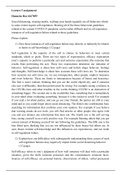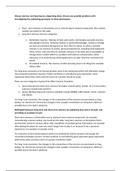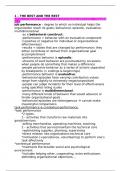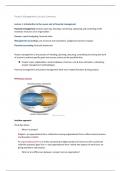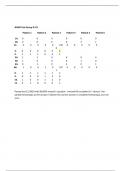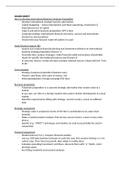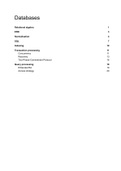Lecture 5 assignment
Hanneke Bos 6167055
Social distancing, wearing masks, washing your hands regularly are all behaviors which
to some extent require self-regulation. Meeting all of the these behavioral guidelines
related to the current COVID-19 pandemic can be rather difficult and we all experience
instances of self-regulation failure related to these guidelines.
Please explain:
1) How these instances of self-regulation failure may directly or indirectly be related
to limits in self-knowledge (1/2 page)
Self regulation is the capacity of the self to chance its behaviors to meet certain
standards, ideals or goals. There are two types of expectancies; efficacy expectation
(one’s capacity to perform a particular act) and outcome expectation (the outcome that
results from performing the act). These two expectations determine our initiation of
behavior. Self-regulation is about how self-views and beliefs shape behavior, feelings
and thoughts. Self-knowledge is about how accurate these self-views are. To determine
how accurate our self-views are, we use introspection, other people, implicit measures
and overt behavior. There are limits to introspection because of biases and heuristics.
The first is naïve realism; thinking that you see the world objectively, and if someone
else sees it differently, than that person must be wrong. For example seeing a relation in
the COVID-crisis and other troubles in the world, thinking COVID is an distraction of
something bigger. The second one is the availability bias; something that is immediately
in your mind when evaluating something, because it is the easiest to recall. For example
if you read a lot about parties, and you go see your friends, the parties are still in your
mind and so you could forget about social distancing. The third is the confirmation bias;
searching for information that confirms your own opinion. For example if you believe
that wearing masks do not work, you will find articles or other people who agree with
you and you dismiss any information that does not. The fourth one is the self serving
bias; seeing yourself in an overly positive way. For example blaming others that you got
corona instead of blaming yourself for not following the guidelines. The fifth one is the
bias blind spot; thinking that you are not influenced by these biases but others are. In
sum, biases restrain self-knowledge and this influences our expectancies, and can result
in self-regulation failure.
2) Explain how our difficulties with subsequently understanding these causes of such
self-regulation failures may negatively impact future social distancing behavior
(1/2 page).
Self-efficacy refers to one’s judgment of how well someone will deal with a particular
situation, given the skills someone possesses and the circumstances someone faces.
Sources of self-efficacy are personal history, observations of others, verbal persuasion
Hanneke Bos 6167055
Social distancing, wearing masks, washing your hands regularly are all behaviors which
to some extent require self-regulation. Meeting all of the these behavioral guidelines
related to the current COVID-19 pandemic can be rather difficult and we all experience
instances of self-regulation failure related to these guidelines.
Please explain:
1) How these instances of self-regulation failure may directly or indirectly be related
to limits in self-knowledge (1/2 page)
Self regulation is the capacity of the self to chance its behaviors to meet certain
standards, ideals or goals. There are two types of expectancies; efficacy expectation
(one’s capacity to perform a particular act) and outcome expectation (the outcome that
results from performing the act). These two expectations determine our initiation of
behavior. Self-regulation is about how self-views and beliefs shape behavior, feelings
and thoughts. Self-knowledge is about how accurate these self-views are. To determine
how accurate our self-views are, we use introspection, other people, implicit measures
and overt behavior. There are limits to introspection because of biases and heuristics.
The first is naïve realism; thinking that you see the world objectively, and if someone
else sees it differently, than that person must be wrong. For example seeing a relation in
the COVID-crisis and other troubles in the world, thinking COVID is an distraction of
something bigger. The second one is the availability bias; something that is immediately
in your mind when evaluating something, because it is the easiest to recall. For example
if you read a lot about parties, and you go see your friends, the parties are still in your
mind and so you could forget about social distancing. The third is the confirmation bias;
searching for information that confirms your own opinion. For example if you believe
that wearing masks do not work, you will find articles or other people who agree with
you and you dismiss any information that does not. The fourth one is the self serving
bias; seeing yourself in an overly positive way. For example blaming others that you got
corona instead of blaming yourself for not following the guidelines. The fifth one is the
bias blind spot; thinking that you are not influenced by these biases but others are. In
sum, biases restrain self-knowledge and this influences our expectancies, and can result
in self-regulation failure.
2) Explain how our difficulties with subsequently understanding these causes of such
self-regulation failures may negatively impact future social distancing behavior
(1/2 page).
Self-efficacy refers to one’s judgment of how well someone will deal with a particular
situation, given the skills someone possesses and the circumstances someone faces.
Sources of self-efficacy are personal history, observations of others, verbal persuasion

